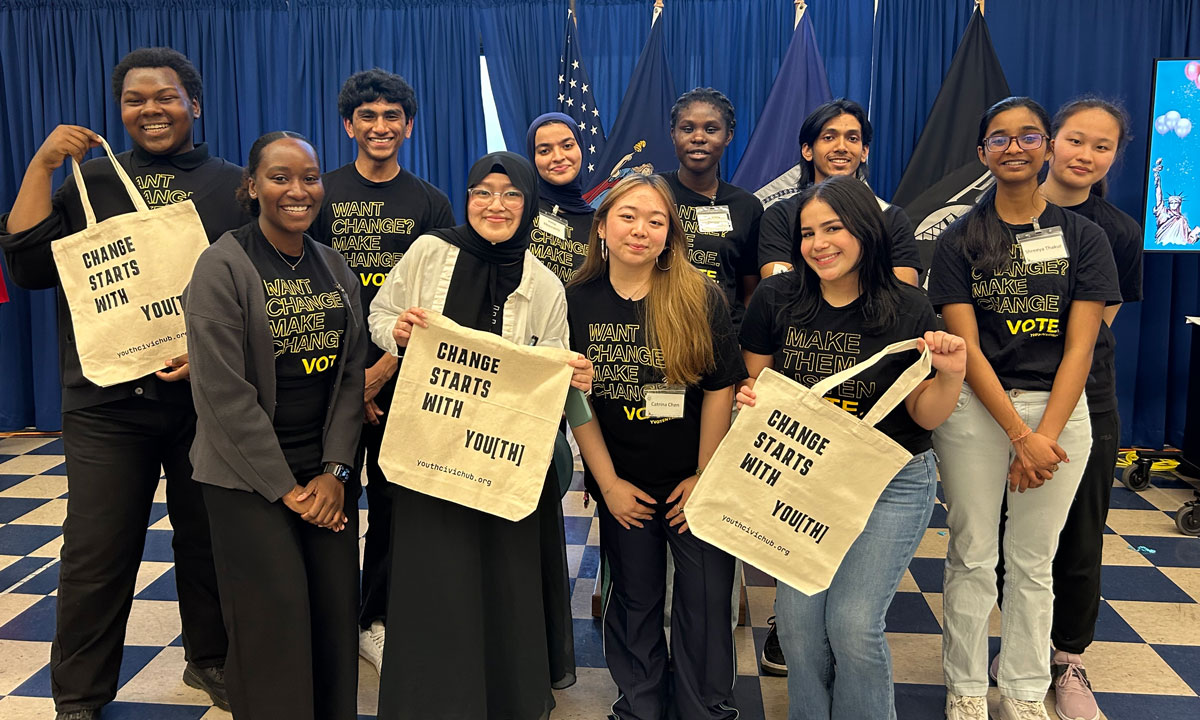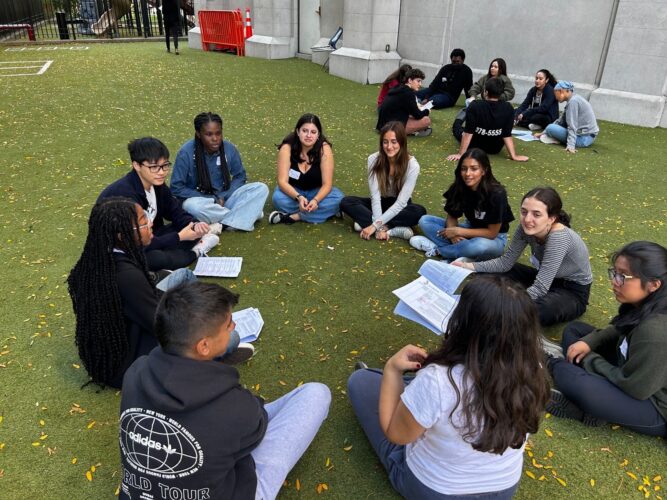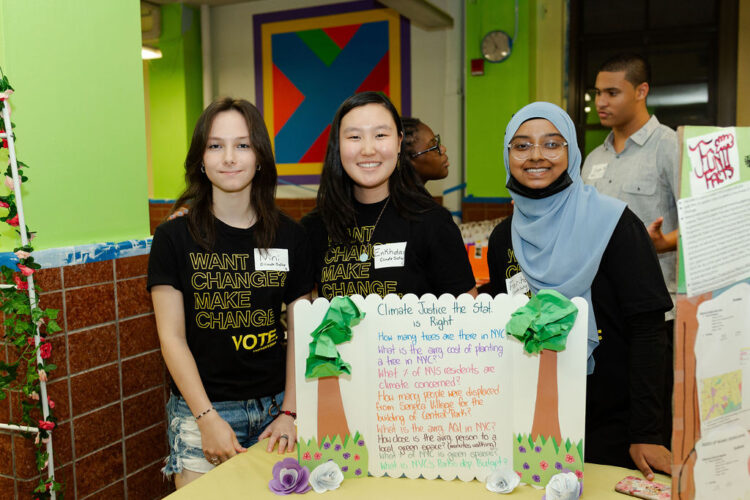NYC Civic Org is Educating Teen Voters About Online Political Misinformation
YVote, a nonprofit by and for young people, is working to combat media illiteracy among Gen Z ahead of the 2024 presidential election.

Get stories like these delivered straight to your inbox. Sign up for The 74 Newsletter
This article is part of The 74’s EDlection 2024 coverage, which takes a look at candidates’ education policies and how they might impact the American education system after the 2024 election.
As political misinformation and disinformation intensify online, civic organizations are tackling media illiteracy among young people ahead of the November presidential election. A Deloitte survey found that over half of Gen Z teens get their news from social media, and a poll last year found that 60% of 13- to 17-year-olds are likely to believe conspiracy theories online. This means young and first-time voters are especially vulnerable to election misinformation.
Organizations like YVote are working to equip Gen Z with the skills to differentiate between what’s real and what’s fake online.
YVote was founded in New York City in 2017 out of concern for low youth voter turnout in the 2016 presidential election, when only 46% of 18- to 29-year-olds nationwide cast a ballot. The organization is youth-centered and youth-led, with a core team of six that includes two high schoolers. The main facilitator is Mukilan Muthukumar, a senior at Hunter College High School. Since its launch, the organization has worked with over 1,500 students across 70 schools.
Kenisha Mahajan, a YVote alumna and lead facilitator, said that since the organization’s founding, it has expanded to civically engage young constituents beyond just voting. “A lot of people on our team banded together and realized that young people need a lot more empowerment and uplifting and also this connection to resources if we’re actually going to get them out to the polls,” Mahajan said.
Mahajan said the organization planned several sessions and activities for its annual, week-long Democracy Camp this month centered on media literacy, including icebreakers on current events, guided discussions on accessing information and trivia-style Kahoot games on media bias.
“For young people that might be concerned about [artificial intelligence], we want to give them a platform to air out their concerns when it comes to what AI and media is looking like and talk about their experiences with it,” she said.
Christine Li and Eloise Gordon are peer leaders for the organization. Li is a junior at Millennium Brooklyn High School and Gordon is a senior at West End Academy Secondary School in Manhattan. The high schoolers worked together this spring on a Civil Action Project with the organization about media literacy and misinformation, which they showcased to about 60 students from several schools, adult leaders from voting and human rights organizations and community members during a virtual presentation. They also worked with journalist Ahmed Baba, co-founder of RANTT Media, to record an episode of The Roundtable: A Next Generation Politics Podcast titled Media Literacy in a Maelstrom.
“I think the consensus within our group was that media literacy was very important for this time of AI, false information and the 2024 election,” Li said. “A lot of the young leaders in our fellowship were really alarmed by how much false information they were interacting with.”
“When you think about the advent of mis- and disinformation since [then-candidate Donald Trump’s] 2016 tweets … the obvious example I point to is the Jan. 6 Capitol riot, which were rooted in mis- and disinformation,” Gordon said.
An analysis from The Brennan Center found that Trump’s election-denial scheme that began in 2020, when he was president, is still impacting the voting process four years later. The organization cited the increase in threats and harassment of poll workers and restrictive voting laws across the country that disproportionately impact voters of color as byproducts of those efforts to overturn the results of the election.
As part of their project, Li, Gordon and other high schoolers brainstormed ways to combat falling for fake information online. One strategy the group implemented is the SIFT method, created by digital literacy expert and research scientist Michael Caulfield. SIFT stands for: Stop, Investigate the source, Find better coverage and Trace claims. Li said it’s a simple yet effective way to find biases and connect to original sources.

Another strategy Gordon said they promoted for detecting AI images is focusing on people’s hands, as artificial intelligence doesn’t have fingers and other small details like teeth figured out. In March, a fake image of Trump being arrested circulated online. One of the biggest signs that it was bogus was the hands of Trump and the police officers in the image.
The group also discussed social media echo chambers and how easy it is to fall into a cycle of interacting only with information you agree with.
“We are really limited in our ideas, especially by algorithms and the conversations we have … I think if we really want to use social media for good, it’s really important that we seek out these new opinions and ideas,” Li said.
For Gordon, Facebook is the most concerning social media app when it comes to fake news being shared widely, “specifically on the news feed section of the Facebook app. We discussed as a group that the idea of a customized news feed inherently sounds flawed because news obviously isn’t customizable.”
Facebook has been sued several times over its content, and in 2021, founder Mark Zuckerberg said 18 million posts with misinformation about COVID had been removed from the site.
As for Li, she said she believes Trump’s Truth Social app is the most dangerous for mis- and disinformation.
“I think it’s a breeding ground for bias and misinformation because it’s not really fully developed. I think other apps do a much better job with regulating content and having fact checkers,” she said.
Aside from the Civic Action Projects, YVote has initiatives like training youth on canvassing for voter registration and participatory budgeting. The organization won first place and $20,000 in a 2021 citywide budgeting campaign to create community gardens at underfunded public schools.

During the organization’s summer camp, NYC teens are guided to envision what democracy looks like to them and are taught skills necessary to create it. They learn about the history of American democracy, craft proposals on specific issues they’d like to tackle and are encouraged to continue what they’ve learned by creating a research project during the school year. Though students don’t receive extra credit at school, those who participate will qualify for Certificates of Activist Excellence and/or Civic Leadership.
The organization also offers a year-long program called the Change Makers Institute, where facilitators aged 17 to 24 lead high school students in monthly virtual sessions to learn about voting and advocacy. They train students on reading news headlines and how to point out ones that may be fake, disreputable or skewed to the left or right politically.
In addition, the organization encourages young people to explore topics they’re passionate about, such as mass incarceration and school segregation and teaches them how voting can impact these issues.
In April, YVote launched Youth Civic Hub, a one-stop shop for New York City youth to learn where and how to vote, find out who is running for office in their area and get information on civic organizations that they may want to get involved in. The hub is run by a team of seven, six of them college students.
The site offers a civics glossary to break down common terms and an interactive map that allows voters to enter their neighborhood and see which politicians represent their area and what authority they have. The hub also features a directory of nearby organizations, an election portal that can help young people register to vote and an opportunities board for those who want to get involved beyond voting.
Get stories like these delivered straight to your inbox. Sign up for The 74 Newsletter

;)
